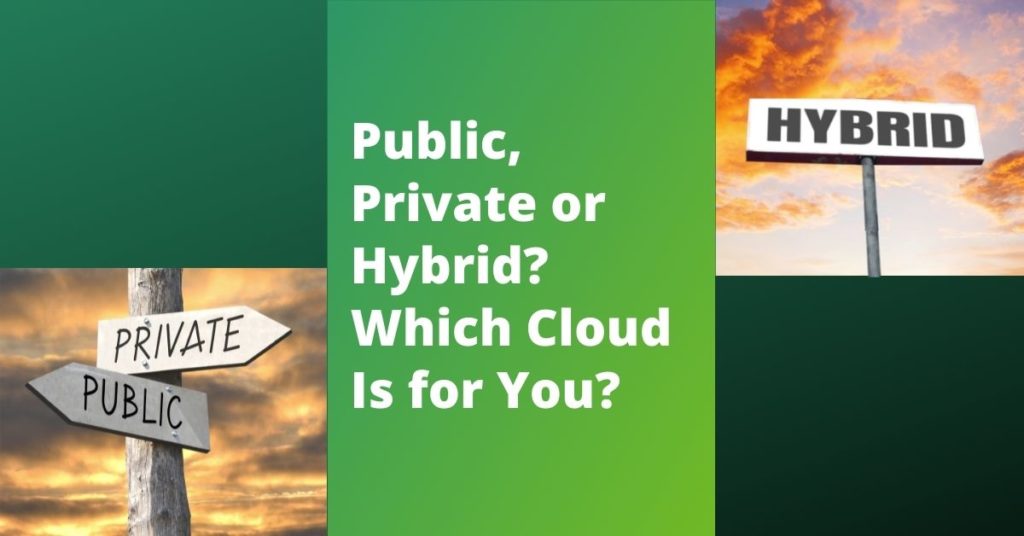
We’re often asked the question of which is best for business cloud services: public, private or hybrid. And our answer is always: it depends on your needs and on your budget. First, though, it’s essential to define the cloud itself and its options.
Over the next few years, if not sooner, your company will probably migrate its data to business cloud services of some kind. It is considered to be the most secure way of protecting sensitive data. An added benefit is that your information or data can be accessed easily by your users from anywhere in the world, which they cannot do if it’s on an office server.
Since COVID-19 necessitated work-from-home situations, many businesses are realizing just how much cloud services can impact their business continuity.
Understanding the Cloud
Visions of an ethereal place on the internet where data floats around without the need for computers is the way most people see the cloud. That’s fiction. Data on the cloud is actually on multiple servers and data centers, allowing businesses to store files, access applications and run servers and desktops from anywhere. There’s no need to worry about capacity projections months (or years) in advance or to purchase (and depreciate) high-cost servers and network equipment. With business cloud services, that is all replaced by a “buy as you go” model. Business cloud services are an operational expense, not a capital expense.
Not to be confused with “hosted” data solutions, a cloud solution is shared across multiple servers and data centers allowing for scalability and survivability. A hosted solution stores your data on someone else’s server. Though there is a value to a hosted solution, it doesn’t provide the same benefits that a true cloud solution provides.
Business cloud services may include:
- Cloud storage
- Data management
- Access to software and applications
- Content delivery
- Service delivery
Differences Between Public Cloud, Private Cloud and Hybrid
Whether your company should join a public cloud, a private one or a hybrid combination of the two depends on your business needs and goals.
Public Cloud Services
Public cloud services are known to most people. Think Google Cloud, Apple iCloud, Microsoft OneDrive as examples. Some might also know about Microsoft Azure and AWS (Amazon’s cloud services). Your cell phone probably automatically updates to a public cloud service such as one of these.
When you use a public cloud, there is a reserved space on a platform with your name or your company’s name on it. There are many other businesses and individuals on that same platform. It’s kind of like a filing cabinet with many locked drawers. No unauthorized person can get into your locked data drawer nor can you get into anyone else’s. But they’re still all in the same filing cabinet.
Public clouds are secure, convenient and affordable. They keep all your data in one place, accessible from devices anywhere with an internet connection. It is not, however, as secure as the private cloud.
Private Cloud Services
There are no other “drawers” on a private cloud. The entire filing cabinet is yours exclusively and not shared with any other company or individual. This is the most secure type of business cloud services, but it is also the most expensive.
Hybrid Cloud Solutions
The hybrid cloud is simply a mix of private and public. Considered the best of both worlds, it allows you to use the cost-effective public cloud for less sensitive data while keeping sensitive data and core systems secure in a private cloud.
Benefits of Business Cloud Services
In case you’re still not sure about moving to a cloud, consider these strategic benefits of cloud computing:
- Security: Cloud services are based off-site of your business which protects data and makes your business less vulnerable to quarantines, storms, natural disasters and other factors that limit access to your place of business. It also isn’t dependent on a single server, so hardware problems have less impact.
- Accessibility: You set permissions on your cloud servers just like you would for on-premises ones, deciding who has access to what. But if people are allowed to access a file, they can do it from anywhere in the world whenever they want. It is also much easier for multiple people to collaborate on the same document with cloud computing.
- Efficiency: Getting on the cloud is typically fast and doesn’t get bogged down when multiple people are on the system.
- Scalability: No need to plan years in advance, as cloud services can be quickly scaled up or down to meet your needs. Also, there is no need to revamp outdated technology as you will always have the latest software and technology.
Migration to cloud services is a silver lining as companies experience less downtime and loss of productivity.
Internos can help you decide which is the best choice for your business and help you migrate your data to your chosen cloud solution. Contact us or book a meeting, virtual or in person. There’s no obligation.

